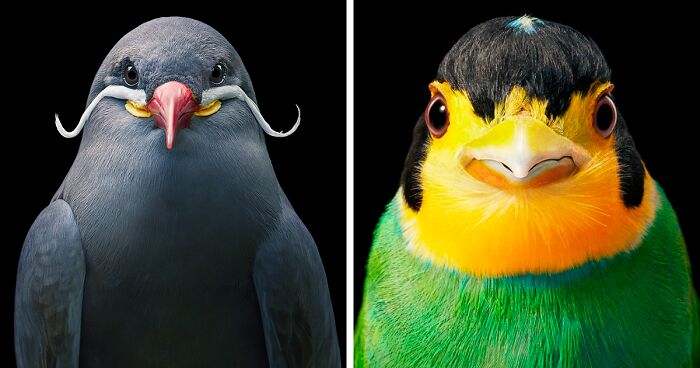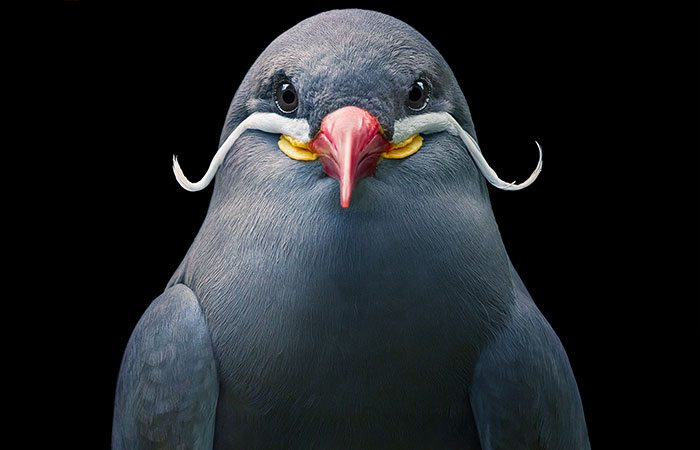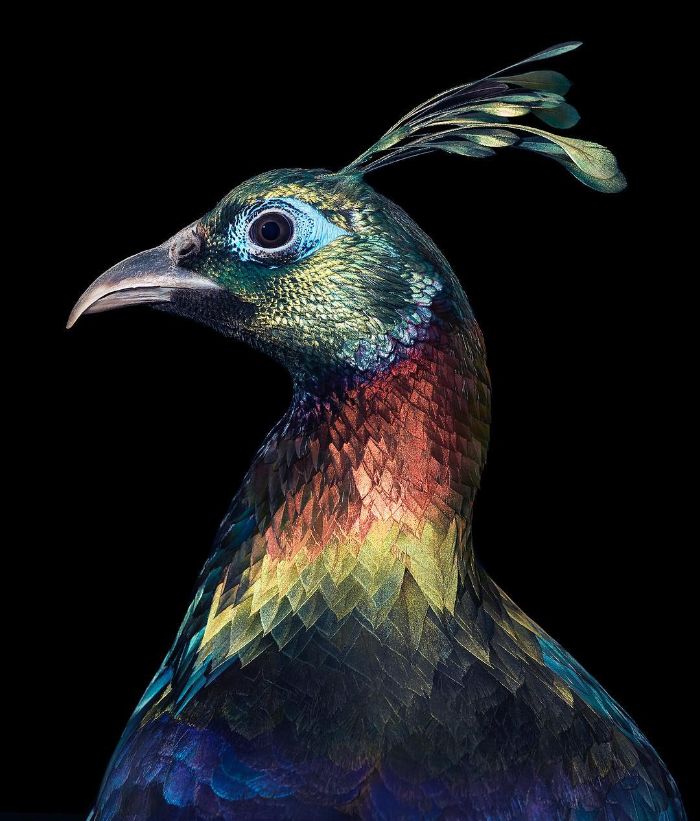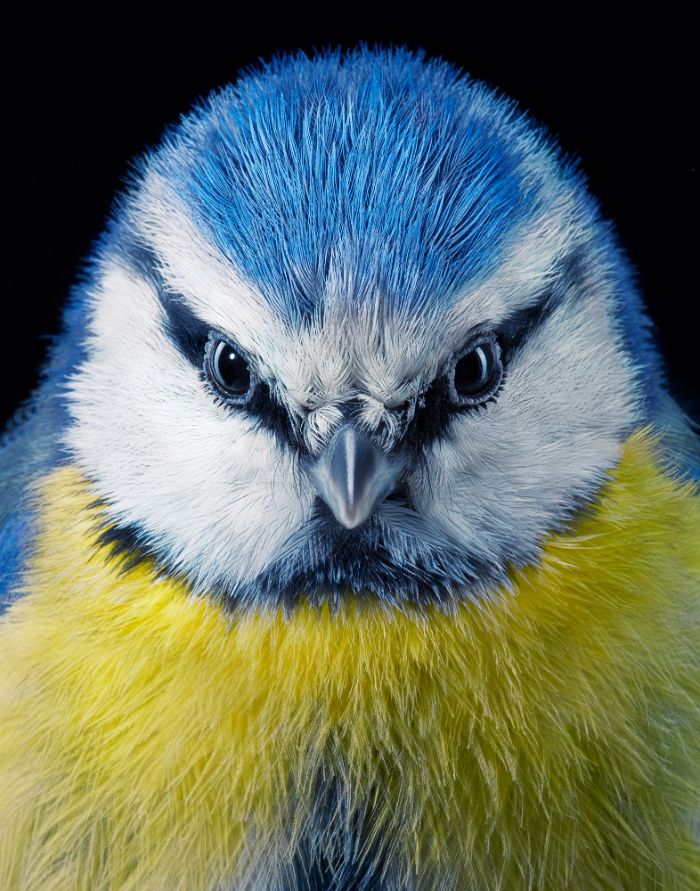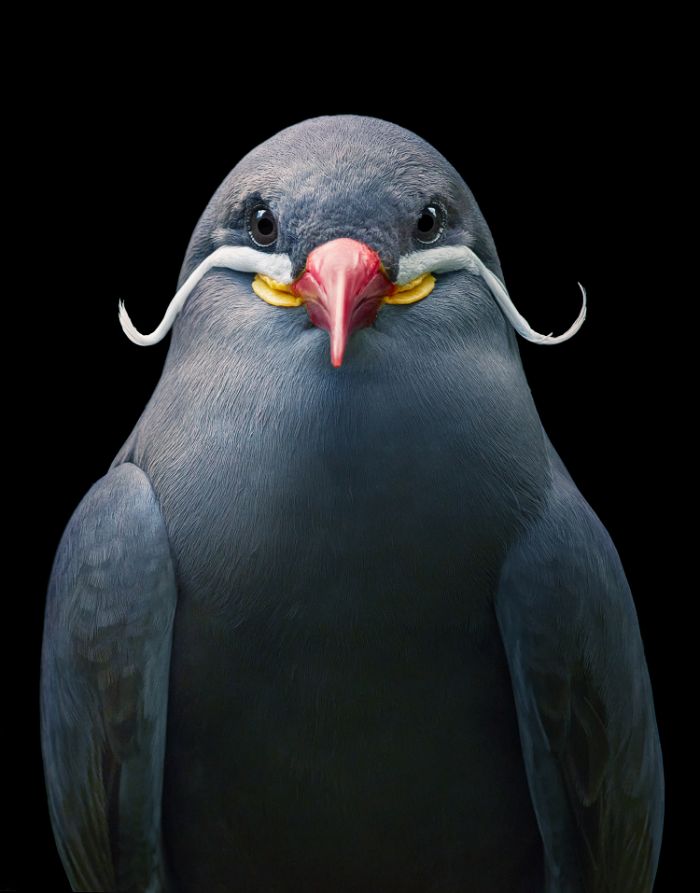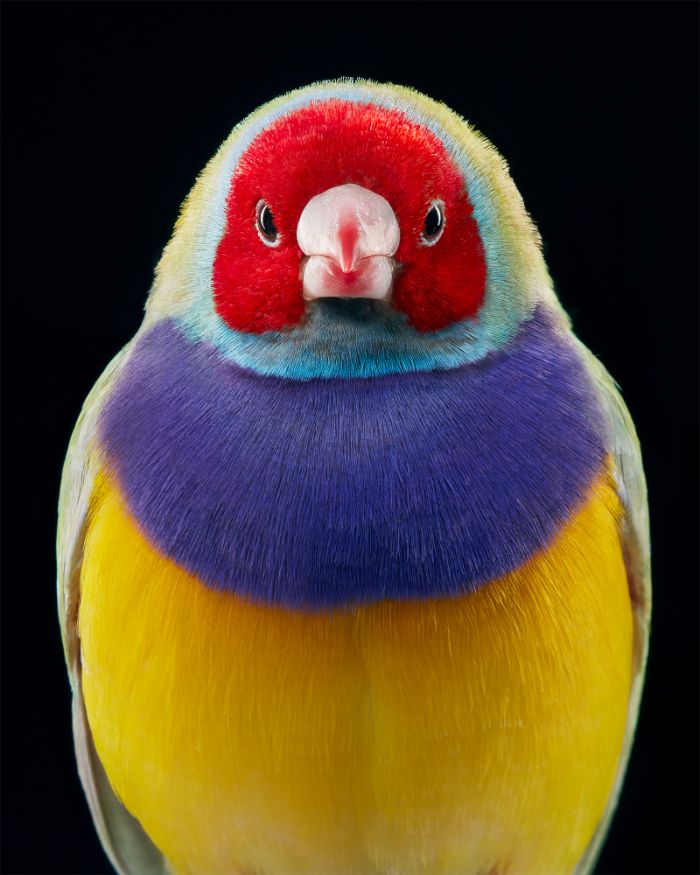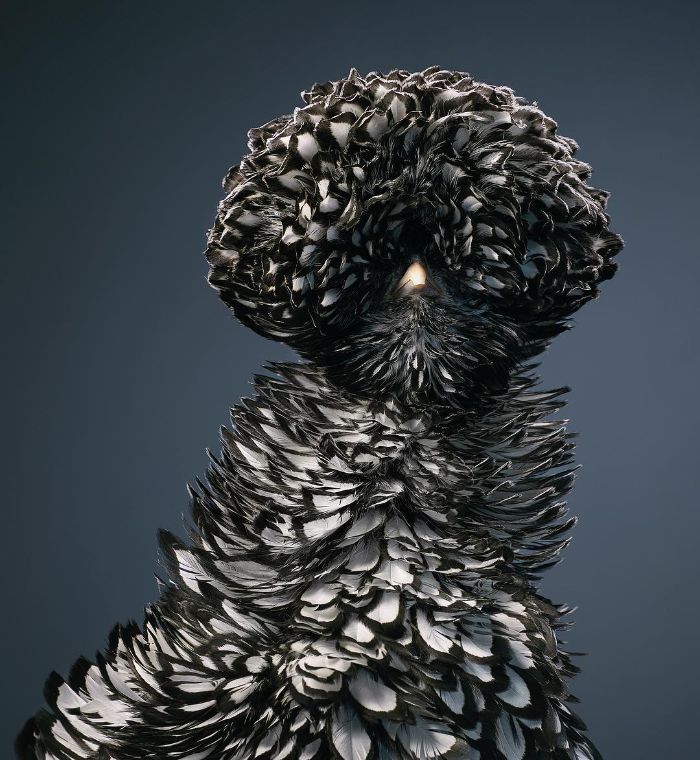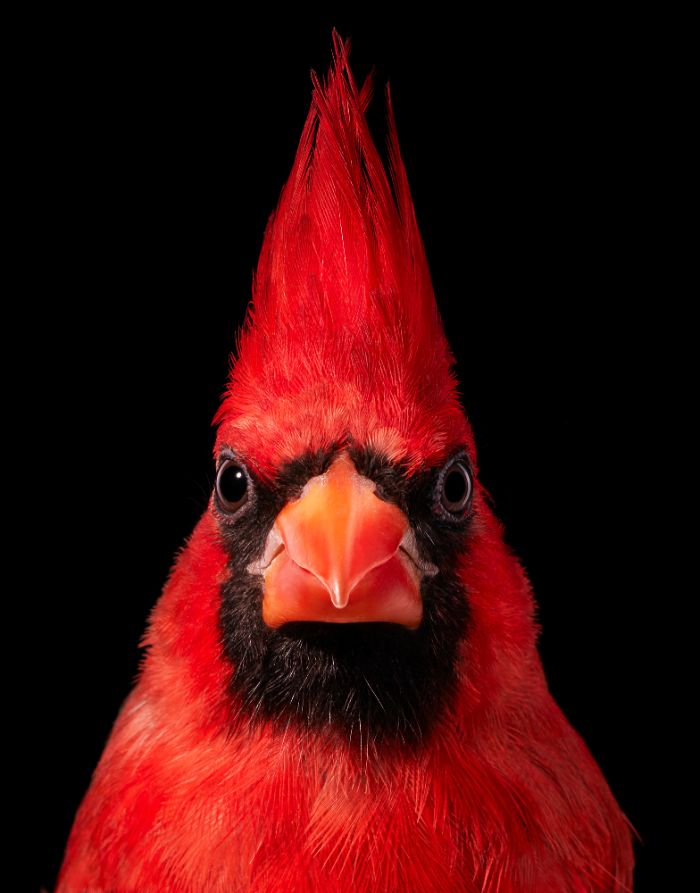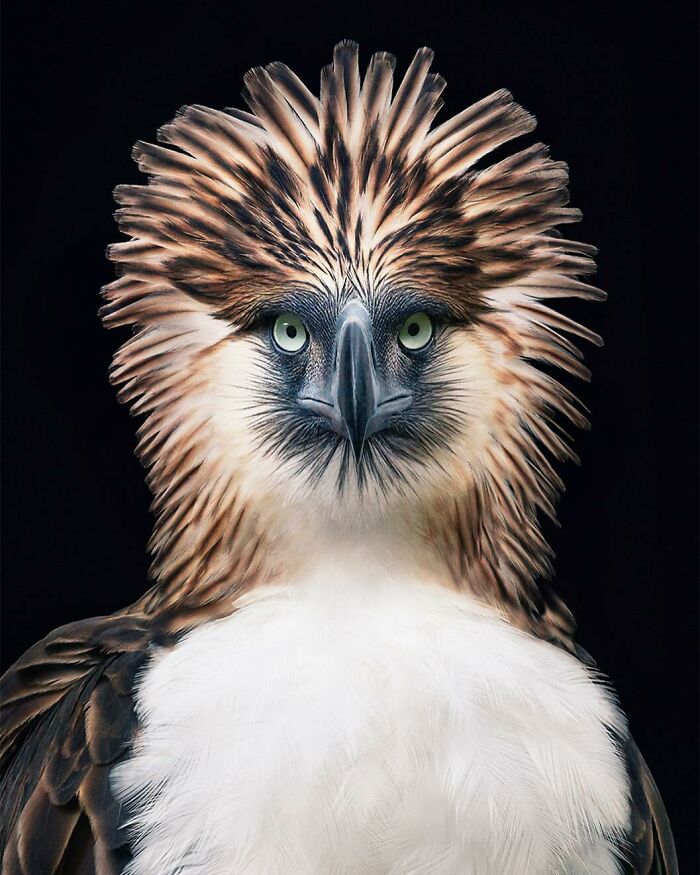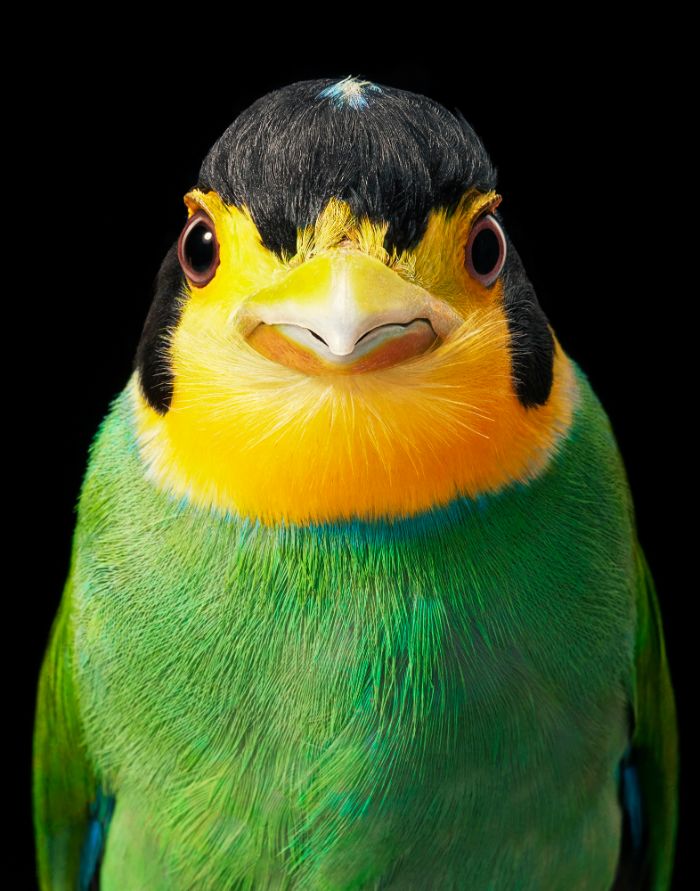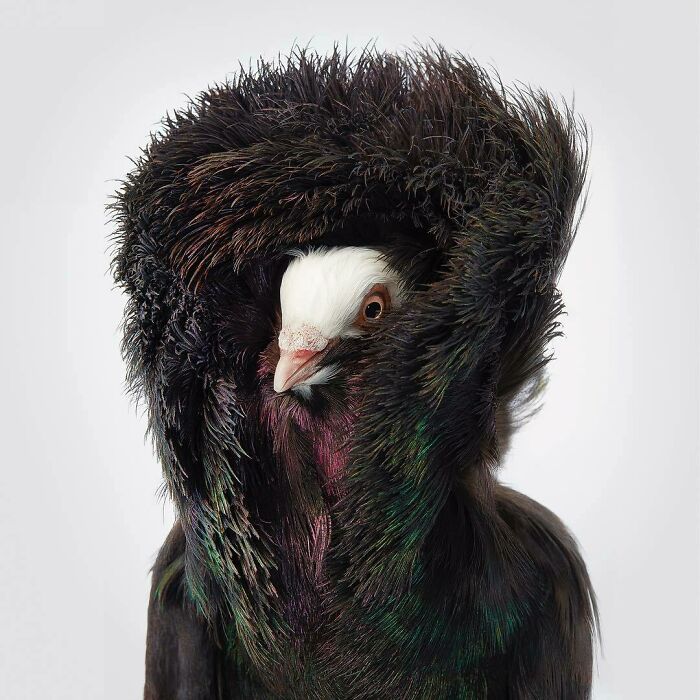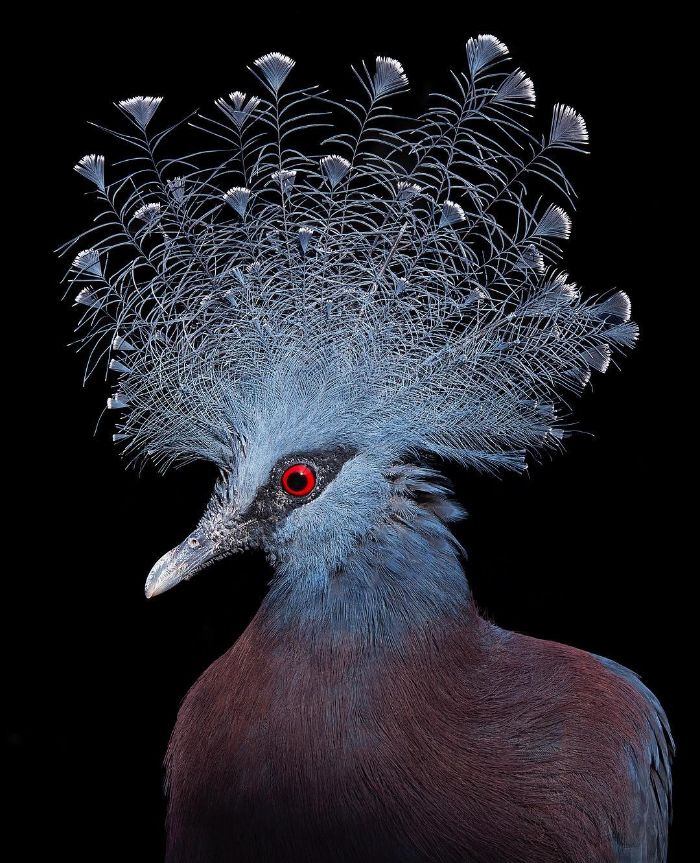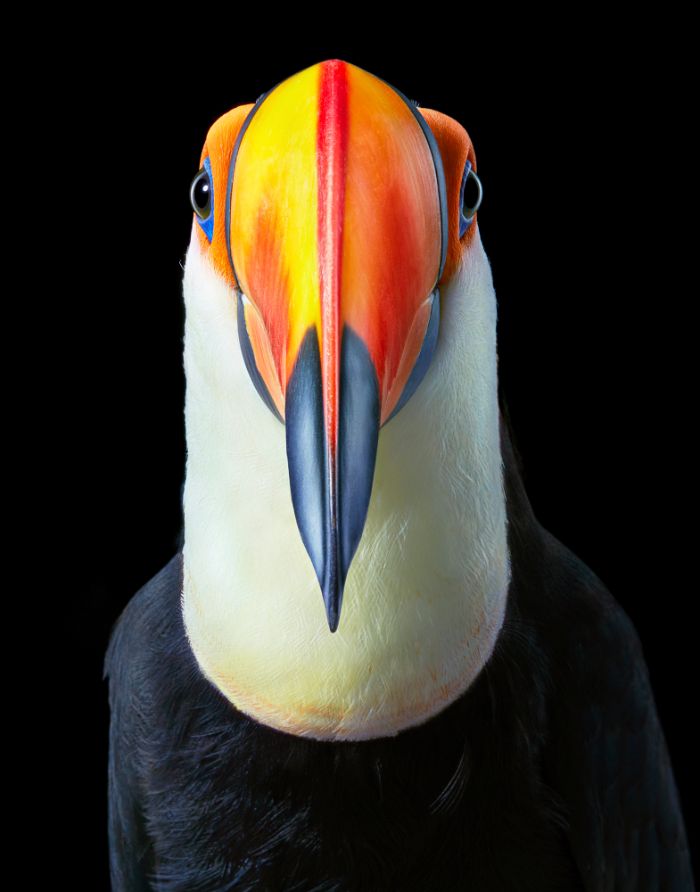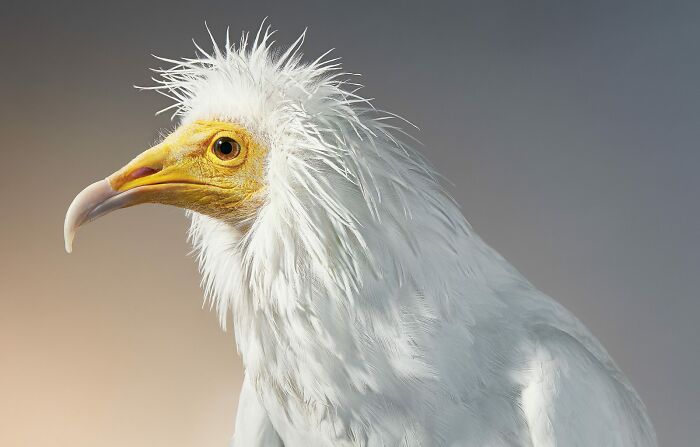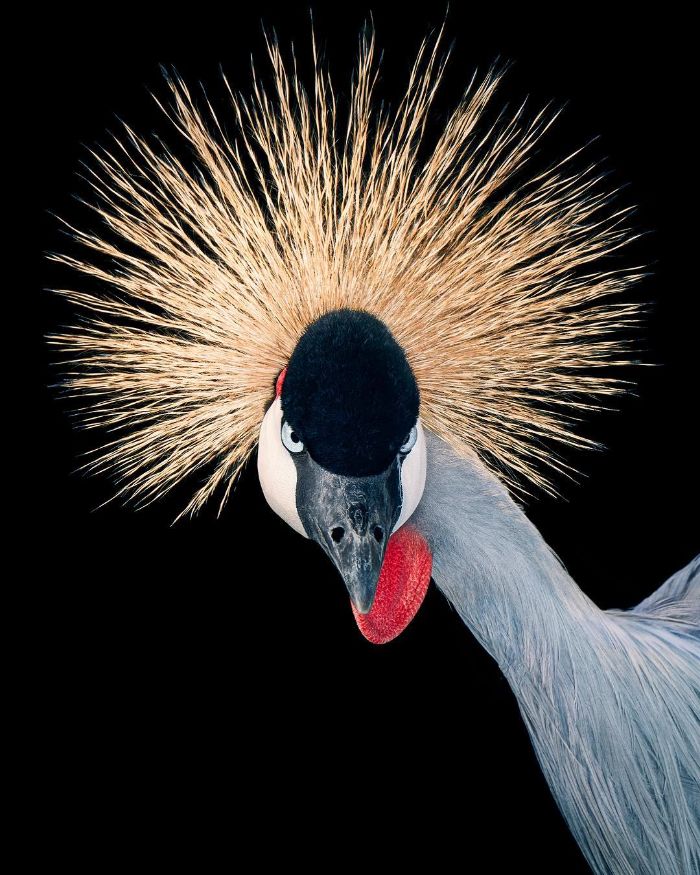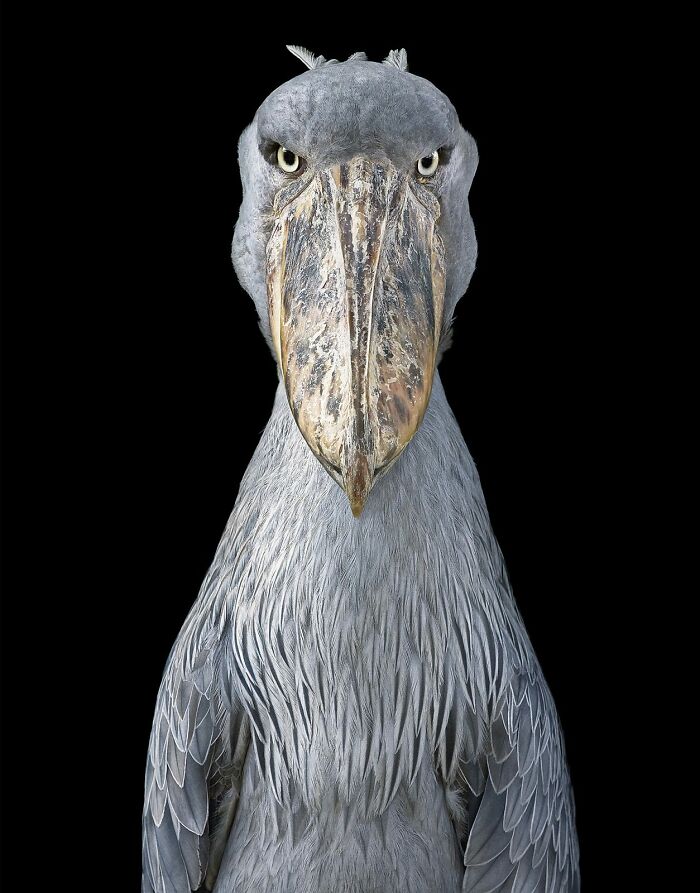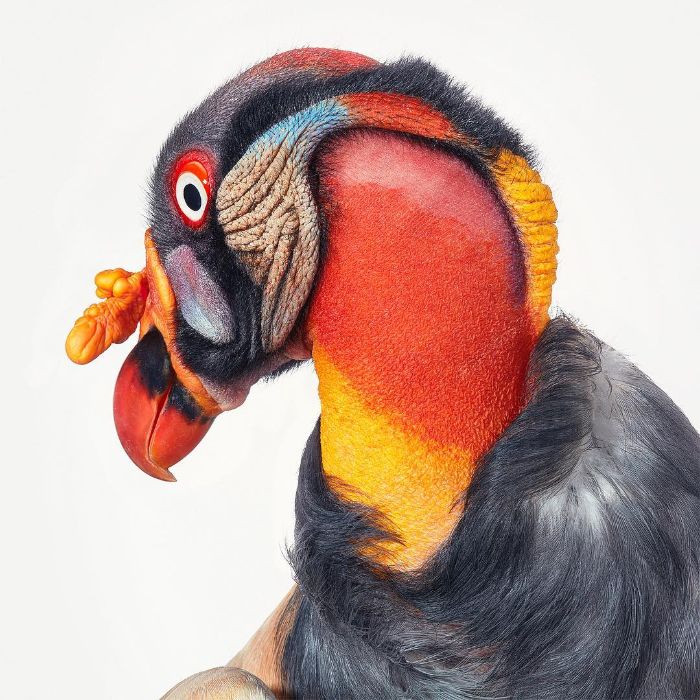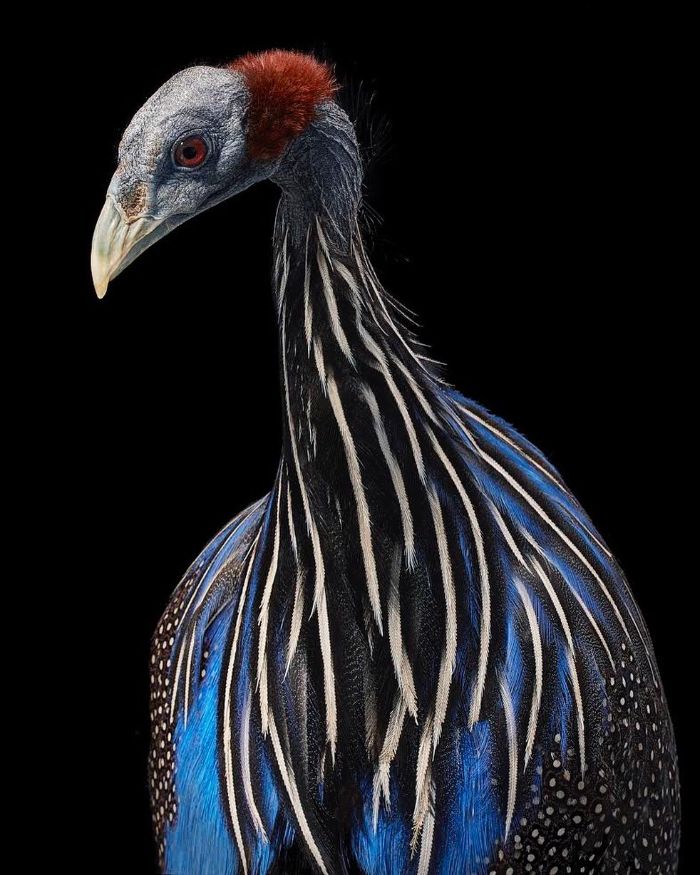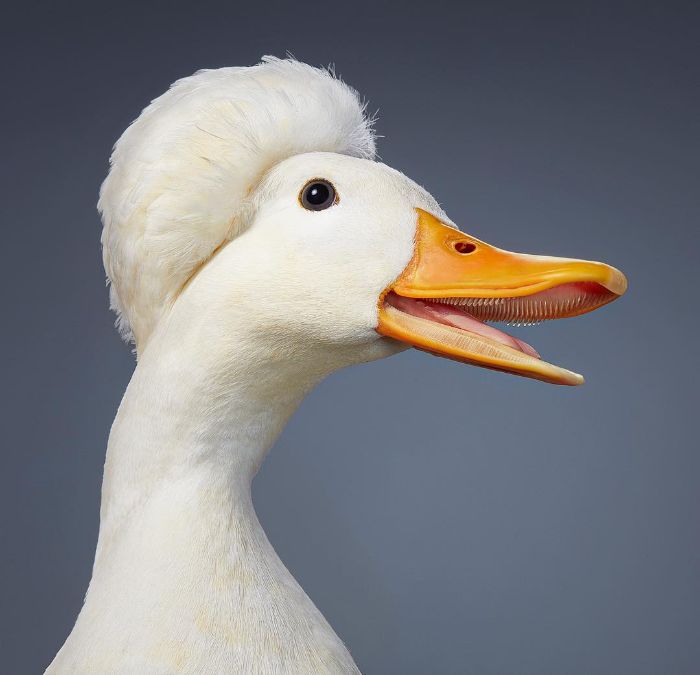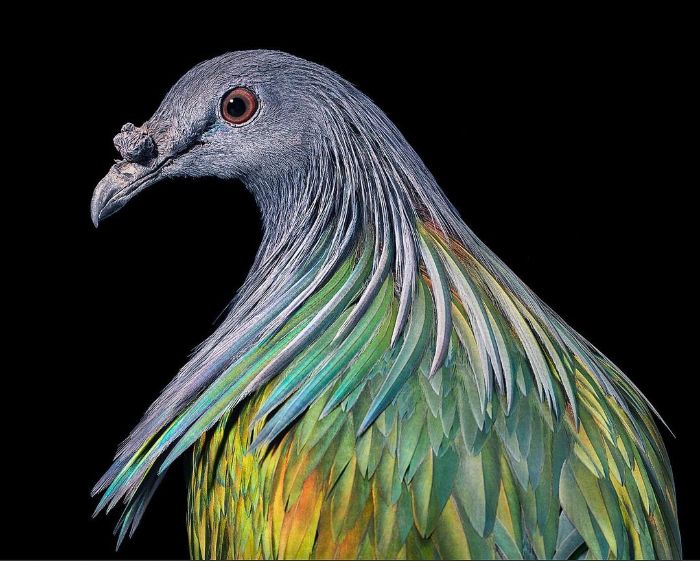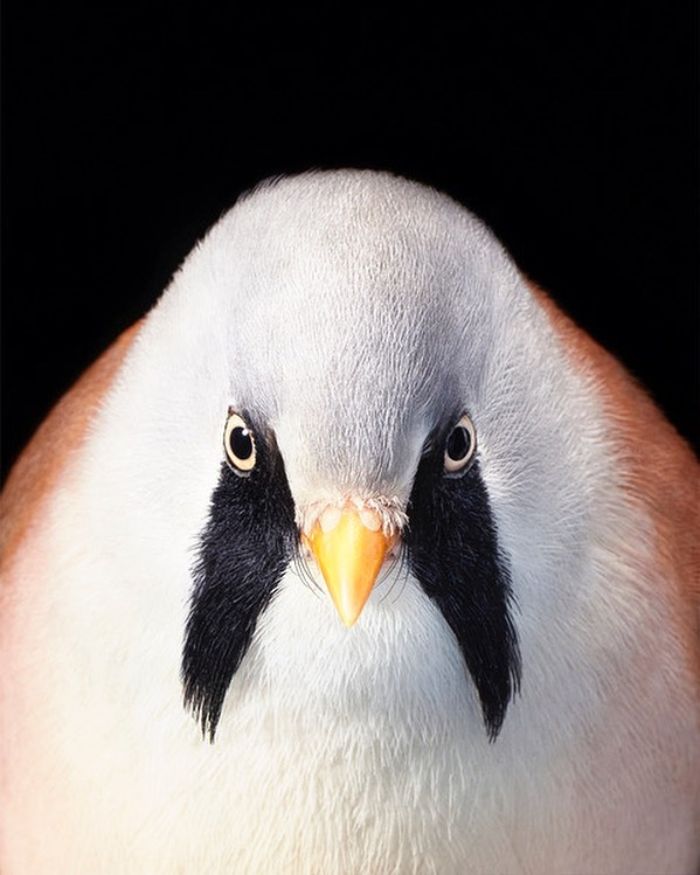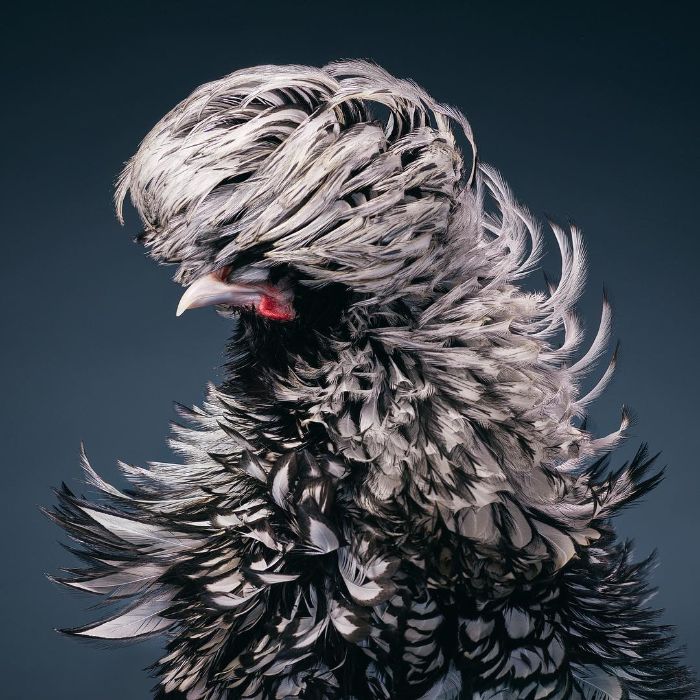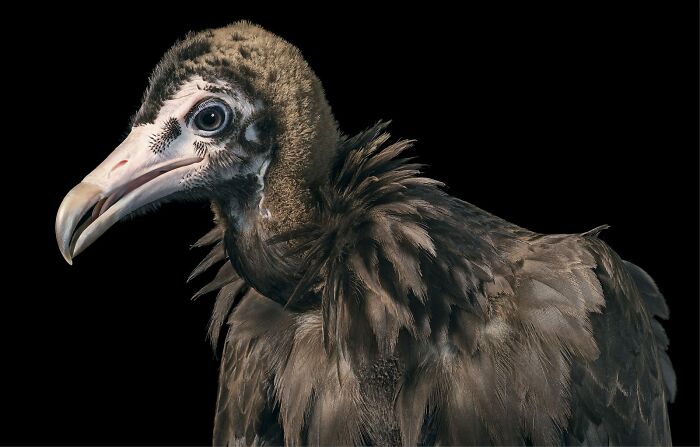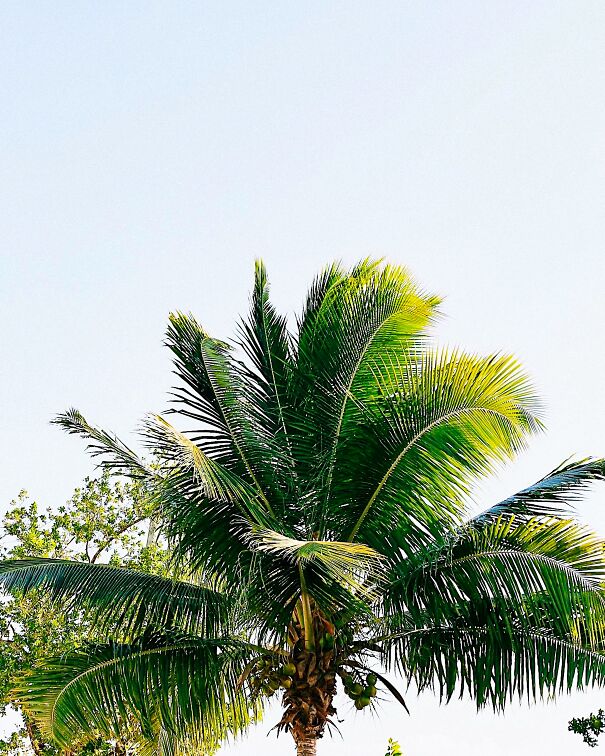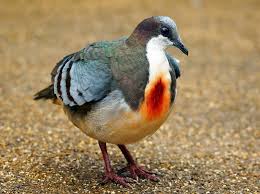Photographer Tim Flach has three goldfish and two Burmese cats. The latter, Hunt and Blue, eagerly keep their owner company while he works, even though they would probably gladly devour some of his subjects.
Flach is known for his striking portraits, where animals are treated with the same care as any human model. The photographer has captured both wild and domesticated animals, but whether he places them against a plain background or meets them in their natural habitat, Flach always manages to highlight their unique appearance.
This time, we're focusing on his bird photos, but if you want to learn more about his magnificent work, check out Flach's books Endangered and More Than Human.
More info: timflach.com | Facebook | Instagram | Twitter
This post may include affiliate links.
The Himalayan Monal
The Himalayan Monal is the national bird of Nepal.
As you can imagine, working with so many models requires not only artistic but organizational skills as well. Flach spends quite a bit of time on his photoshoots. "It really depends on the kind of project I'm doing," he told Bored Panda. "If I'm doing a commission, and say, I'm most likely to be photographing a domestic animal like a cat or dog, then I probably work through a wrangler or handler because at that point, everything needs to be confirmed with the agency and the client."
"But when I work on my own personal projects, it's often that I'm following a concept or an idea. And that animal then is to represent that," the photographer explained. "Then the next question is, how do I access those animals? Well, then, of course, I have to take the situation, case by case. For example, if I want to access an endangered Saiga that can only be found in some national park near the Caspian Sea in Russia, then, of course, I have to get my friend in Moscow to organize something with the national park to get some kind of permission and visa."
Blue Tit
Blue Tits are a common sight at bird tables in the U.K. Researchers found that the British put double the food in bird feeders than our European neighbours, which they believe is contributing to some bird species developing longer beaks.
The next thing is having someone on the ground who actually knows what the behavior of those animals is. In the case of a particular project Flach is working on now, a book on birds, he has a guy who's like a producer and is highly knowledgeable about birds, and even owns some. Then, the photographer has to develop a case by case approach as to whether those birds could be put into an aviary in the studio, whether there's some kind of permission he has to get through a zoo, and so on. "I have to present a kind of case for why I want to get that access to them. For example, at the moment, I'm trying to get access to a very rare fossil. That fossil is unique, and I have to have a conference call with various people at the museum to convince them that it's worth me having access to such an extraordinarily rare and important fossil."
Inca Tern
This for me, is the Salvador Dali of the bird world. When it comes to the length of the Peruvian Inca tern’s moustache, longer is healthier. A longer moustache indicates a stronger immune system and therefore a more attractive proposition for courtship.
So naturally, Tim's photoshoots are incredibly varied. "I think the one thing as a photographer is that though you can have your kind of formulas and approaches to certain problem solving, when it comes to the animals, each can have different situations whether that means diving with hammerhead sharks, or tracking down polar bears in the Arctic, or penguins as I did in the Antarctic last Christmas. That's slightly different than my models in the studio."
The vast majority of animals Flach photographs are untrained, including birds. "With a bird book, I might have over 100 birds, and yes, the parrots and the ones for shows, of course, they're quite trained but for the vast majority of my animals, I'm there, literally perched behind a hideout with an 800mm lens, waiting for something just to turn in my direction."
The Gouldian Finch
The Gouldian finch from Australia for me is one of the most colourful of all finches. I was fortunate to have a model on the day that permitted me to come so close, sometimes times too close, as it decided to land on my head a number of times rather than to stay on his perch.
In the studio, of course, the process is quite different. The photographer has a special aviary which makes it impossible for the animal to see him. There's even a turntable. "Often, the birds are happily perched on this and it whizzes in circles, so I can get the exact angle I want. The opportunities where I can have control and how much control can vary enormously."
Tim says there is a sense of awe and wonderment in the uncertainty of photographing animals; you never fully know what will reveal itself in front of the lens. And that is the beauty of his work; he doesn't force anything, instead, Tim allows his subjects to speak and gives the viewers space to make up everything else.
Silver Laced Polish Chicken
Northern Red Cardinal
Northern red cardinals are adept songsters, with individuals being able to produce more than a dozen song variations. This particular cardinal had a fair bit of attitude, as though he could have flown straight out of Angry Birds.
Major Mitchell
The beautiful crest on the heads of cockatoos is one of the things that sets them apart from other parrots. However, they share the longevity of many members of the parrot family, and have a very similar life span to humans.
The Philippine Eagle
I spend days travelling through the Mountains on the Philippine islands looking for this eagle, and in the end I photographed it at a rescue sanctuary.
The Philippine Eagle has one of the largest wing spans of any eagle, at 2 metres, and is only found on the Philippine islands, where it is the national bird.
IUCN: Critically Endangered
Jacobin Pigeon
The Jacobins are one of the oldest domestic pigeon breeds in the world, originating from India. Their arrival in Europe during the 16th Century is what sparked their evolution into the fashionable exhibition birds we see today.
Longtail Broadbill
This long-tailed broadbill can be found from the Himalayas to South East Asia. He reminds me of a fighter pilot - but a lot of you seem to think he looks like Elvis - with his helmet-like black cap and sleek blue patch on their crown.
Black Jacobin Pigeon
The Jacobin received its European name because it’s hood of feathers resembles the garments worn by the Jacobin order of monks. For others it resembles a lady in feathery clothing.
Victoria Crowned Pigeon
The Victoria Crowned Pigeon is considered the largest of the living pigeon species, and can be found on mainland New Guinea. The only larger member of the pigeon family would have been the Dodo.
The Toco Toucan
The Toco Toucan’s bill is the largest relative to body size of any bird and it can be used to regulate heat distribution similar to elephants ears. While sleeping, heat loss can be reduced by placing their bill under their wing.
Don't you dare look down your nose at me! Give me a another view to really show the beauty of it!
Egyptian Vulture
Red Splash Jacobin Pigeon
The Jacobin’s probably the most regal pigeon, having been kept by the likes of Charles Darwin and Queen Victoria.
It gets its name because of the hood of feathers enveloping it’s head.
Andean Cock Of The Rock
During breeding male Cock-of-the-rock take part in “confrontation displays” which is rather like a dance battle with other males which gets more and more frenzied as the female approaches.
Pfft, hahaha. The name gave me a good giggle. C’mon Foxxy, grow up lol.
The Grey Crowned Crane
The Grey Crowned Crane, from Southern and Eastern Africa, has a reputation for being rather short tempered and can potentially take ones eye out with a single peck. When he started pecking at my camera and seemed intent to start on me, I didn’t hang around!
Shoebill
The King Vulture
The Mayans once believed that the King vulture was the messenger between gods and people.
Contrary to the common association between vultures and deserts, the King vulture inhabits the dense forests found in South America up to Mexico!
Vultrurine Guineafowl Hen
Vultrurine Guineafowl hens can lay up to 40 eggs per season - this might be one of the reasons that this bird is not a threatened species! They are found in the bushy half-deserts of Eastern Africa and spend most of their time running rather than flying.
Crested Miniature Duck
This domestic duck is a Crested Miniature. Comb-like structures around the edge of their beak allow them to strain through the mud for food such as insects.
The Nicobar Pigeon
The Nicobar Pigeon is the closest living relative to the Dodo. They are a threatened species hunted for food and their gizzard stones are extracted for jewellery. They are a nomadic species moving from places like the Nicobar islands in India to other coastal regions in Southeast Asia.
Bearded Tit
Bearded tits are the only British songbird to stay and breed in reed beds all year round. There are less than 600 breeding pairs of bearded tits found in Britain, most likely because they are limited by habitat, building their nests low down in the reeds. A group of bearded tits is called a ‘banditry’.
This Silver-Laced Rooster
This Silver-Laced rooster has come to symbolise, in Polish literature and art, a country gentleman from medieval Poland. I took this photograph at the Federation Championship Poultry Show last week.
Hooded Vulture
Another stately scavenger shared here. The pics of them in this collection reminded me of an essay that helped me appreciate their presence in the bird world..."On Coming Back as a Buzzard" by Lia Purpura. Worth a web search and worthy of the way you've given these birds a dignified visage.
Awesome photos, I am impressed at how so many photos are straight on. What did they do to get the birds in those positions and stay still to take a photo.
Beautiful photos - each photo captures so many intricate details one normally would never see so close! Thank you for sharing your talented artistry with us! Your camera and film your brush & canvas and a keen eye for beauty! Awesome!
They looked Beautiful and funny at the same time, Great post!
And this, my friends, is why birdwatching and tourism can make more money than logging in South America. So much diversity and life!
Congrats to the photographer! Great birds and photos. Love learning about birds.
One of my favorite Bored Panda's offerings..... I so love anticipating what B.P. has next for us... thoroughly enjoy this site . . .so glad I found you ! ! !
You should watch Dancing With The Birds on Netflix. It shows different birds of paradise.
yea but some are called "tits" tho- I may or may not be really immature o_o
This post makes me so happy I chose Ornithology as a path of education.
I would have liked to have seen only rare and endangered birds, like the title suggests. Cardinals are in no way rare and the blue tit is literally described as a common sight..
I would have liked to have seen only rare birds, as the title suggests. Cardinals are in no way rare or endangered and the blue tit is literally described as a common sight...
some of these are so crazy, that I had to look them up to see if they were real, or if this post was just pulling our leg with photoshoped images.
Awesome photos, I am impressed at how so many photos are straight on. What did they do to get the birds in those positions and stay still to take a photo.
Beautiful photos - each photo captures so many intricate details one normally would never see so close! Thank you for sharing your talented artistry with us! Your camera and film your brush & canvas and a keen eye for beauty! Awesome!
They looked Beautiful and funny at the same time, Great post!
And this, my friends, is why birdwatching and tourism can make more money than logging in South America. So much diversity and life!
Congrats to the photographer! Great birds and photos. Love learning about birds.
One of my favorite Bored Panda's offerings..... I so love anticipating what B.P. has next for us... thoroughly enjoy this site . . .so glad I found you ! ! !
You should watch Dancing With The Birds on Netflix. It shows different birds of paradise.
yea but some are called "tits" tho- I may or may not be really immature o_o
This post makes me so happy I chose Ornithology as a path of education.
I would have liked to have seen only rare and endangered birds, like the title suggests. Cardinals are in no way rare and the blue tit is literally described as a common sight..
I would have liked to have seen only rare birds, as the title suggests. Cardinals are in no way rare or endangered and the blue tit is literally described as a common sight...
some of these are so crazy, that I had to look them up to see if they were real, or if this post was just pulling our leg with photoshoped images.

 Dark Mode
Dark Mode  No fees, cancel anytime
No fees, cancel anytime 




